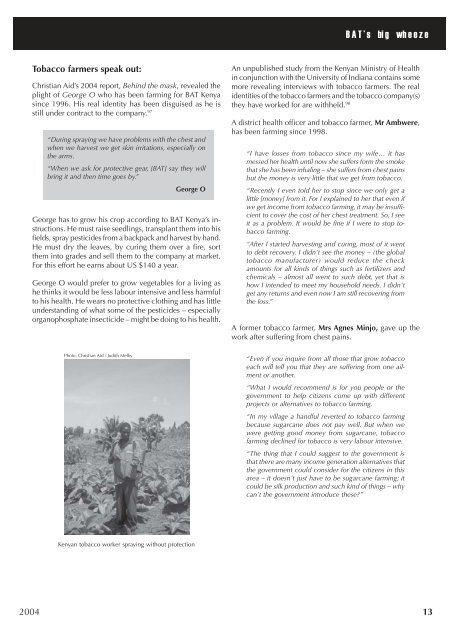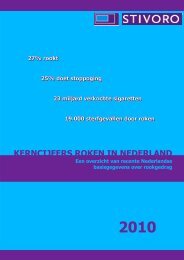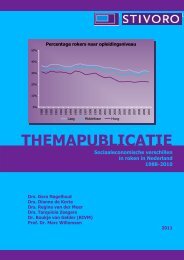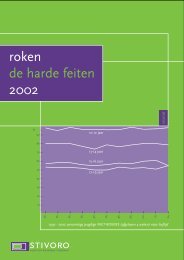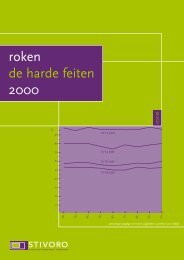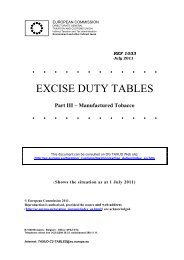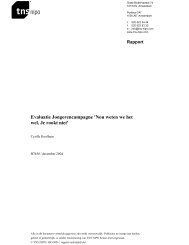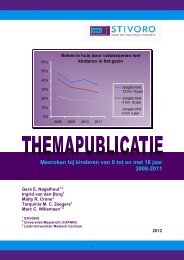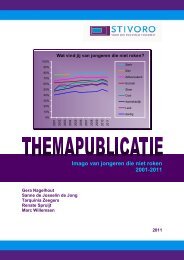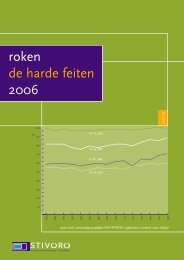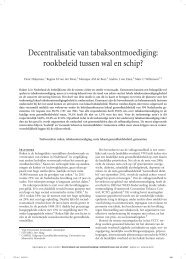BATs big wheeze.pmd - Stivoro
BATs big wheeze.pmd - Stivoro
BATs big wheeze.pmd - Stivoro
You also want an ePaper? Increase the reach of your titles
YUMPU automatically turns print PDFs into web optimized ePapers that Google loves.
BAT’s <strong>big</strong> <strong>wheeze</strong>Tobacco farmers speak out:Christian Aid’s 2004 report, Behind the mask, revealed theplight of George O who has been farming for BAT Kenyasince 1996. His real identity has been disguised as he isstill under contract to the company. 97“During spraying we have problems with the chest andwhen we harvest we get skin irritations, especially onthe arms.“When we ask for protective gear, [BAT] say they willbring it and then time goes by.”George OGeorge has to grow his crop according to BAT Kenya’s instructions.He must raise seedlings, transplant them into hisfields, spray pesticides from a backpack and harvest by hand.He must dry the leaves, by curing them over a fire, sortthem into grades and sell them to the company at market.For this effort he earns about US $140 a year.George O would prefer to grow vegetables for a living ashe thinks it would be less labour intensive and less harmfulto his health. He wears no protective clothing and has littleunderstanding of what some of the pesticides – especiallyorganophosphate insecticide – might be doing to his health.An unpublished study from the Kenyan Ministry of Healthin conjunction with the University of Indiana contains somemore revealing interviews with tobacco farmers. The realidentities of the tobacco farmers and the tobacco company(s)they have worked for are withheld. 98A district health officer and tobacco farmer, Mr Ambwere,has been farming since 1998.“I have losses from tobacco since my wife… it hasmessed her health until now she suffers form the smokethat she has been inhaling – she suffers from chest painsbut the money is very little that we get from tobacco.“Recently I even told her to stop since we only get alittle [money] from it. For I explained to her that even ifwe get income from tobacco farming, it may be insufficientto cover the cost of her chest treatment. So, I seeit as a problem. It would be fine if I were to stop tobaccofarming.“After I started harvesting and curing, most of it wentto debt recovery. I didn’t see the money – (the globaltobacco manufacturer) would reduce the checkamounts for all kinds of things such as fertilizers andchemicals – almost all went to such debt, yet that ishow I intended to meet my household needs. I didn’tget any returns and even now I am still recovering fromthe loss.”A former tobacco farmer, Mrs Agnes Minjo, gave up thework after suffering from chest pains.Photo: Christian Aid / Judith Melby“Even if you inquire from all those that grow tobaccoeach will tell you that they are suffering from one ailmentor another.“What I would recommend is for you people or thegovernment to help citizens come up with differentprojects or alternatives to tobacco farming.“In my village a handful reverted to tobacco farmingbecause sugarcane does not pay well. But when wewere getting good money from sugarcane, tobaccofarming declined for tobacco is very labour intensive.“The thing that I could suggest to the government isthat there are many income generation alternatives thatthe government could consider for the citizens in thisarea – it doesn’t just have to be sugarcane farming; itcould be silk production and such kind of things – whycan’t the government introduce these?”Kenyan tobacco worker spraying without protection200413


